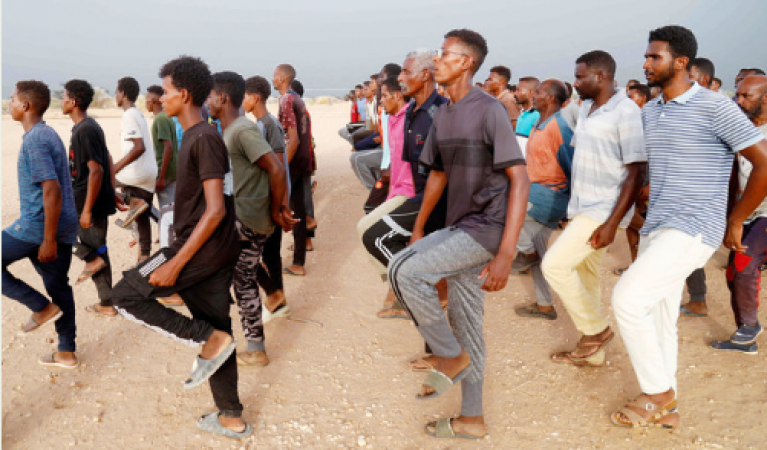
Cairo; The 19-year-old information technology student Sarah Al-Sharif left her books and computer behind when she and her family were forced to flee the capital of Sudan due to war.
She is currently in Sennar, 30 kilometres southeast of Khartoum, and, like many others, she sees no way to continue her studies while fighting between opposing military factions rages because she lacks a reliable internet connection and a passport to travel abroad.
The conflict, which started in mid-April, has caused Sudan's already failing educational system to collapse, leading to the closure of many schools or their use as temporary housing for displaced people, as well as the cancellation of the majority of national end-of-year exams.
The situation in Sudan has worsened to the point of being impossible as a result of this war, claimed Sharif.
Also Read: UN Official Depicts Heartrending Palestinian Trauma Following Camp Clashes in Lebanon
Over 4 million people have been displaced within Sudan and across its borders as a result of the conflict, which has also brought daily battles to Khartoum's streets and a resurgence of ethnically targeted attacks in Darfur.
Simone Vis of UNICEF in Sudan claims that there are "an alarming number of reports that both boys and girls are being recruited by armed groups."
According to the UN, at least 89 schools in seven states are being used as shelters for the displaced, which raises concerns that many kids won't have access to schools in the upcoming school year and might be subjected to child labour and abuse.
The majority of the year-end exams in the war-affected regions were cancelled by the education minister on Wednesday.
Also Read: Blinken Affirms No Sanctions Relief for Iran Amid Prisoner Release Negotiation
Sahar Abdullah, a Khartoum-based teacher who has also fled his home city and is seeking asylum in Sennar, said, "In the current circumstances, anyone would see that it is impossible to have a new academic year."
Save The Children ranked Sudan as one of the top four countries in the world where education was in grave danger even before the conflict between the Sudanese army and the paramilitary Rapid Support Forces, or RSF.
More than 1 million school-aged children have been displaced, and at least 10,400 schools have been closed since the fighting began, according to the charity. The number of children who are no longer in school has increased from 6.9 million to 9 million.
Khartoum has a proud intellectual tradition, but due to underfunding, political meddling, and a severe economic crisis, the educational system has fallen into disrepair. Street protests before and after the ouster of former leader Omar Bashir in 2019, unusually severe flooding in 2020, and the coronavirus pandemic then caused it to be disrupted.
Some students would bring chairs to class because of the crowded conditions in school classrooms. To support teachers in their work, there weren't enough textbooks, according to Abdullah, the fired teacher.
Just before the war started, state-employed teachers went on a three-month strike over pay and working conditions. According to a senior member of the Sudanese Teachers' Committee, as many as 300,000 teachers have not received pay since March.
Fatima Mohammed, a displaced teacher who fled Khartoum to Gedaraf state after her school was taken over by the RSF, said, "I haven't been paid a salary in four months, and I have no idea when I'll return to work."
Rabab Nasreldeen had completed the second year of her third year of law school at the University of Khartoum despite the interruptions in previous years.
She was forced to leave as well, leaving behind any documents and diplomas that might have allowed her to continue her education elsewhere.
We are left with no choice but to wait and pray for the best, she said. Aid workers are working to ease the crisis by creating secure learning environments and offering children psychosocial support.
With $12.5 million in donations, the UN global fund for education in emergencies, Education Cannot Wait, aims to provide educational services for 120,000 children in Sudan and surrounding nations.
In the midst of the COVID-19 pandemic, wealthy parents "didn't want the children to wait a year or a month for their education," according to Yasmine Sherif, the fund's executive director.
Why then should we expect the Sudanese people to postpone their education until the conflict is resolved?
Also Read: Deadly Daesh Attack Claims 23 Syrian Soldiers in Ongoing Struggle Against Militancy
Some refugees from Sudan are attempting to enrol in colleges and universities in countries other than their home country, such as Egypt. However, there are no such options in Chad, where more than 377,000 refugees have arrived.
Khalifa Adam, a refugee student from Darfur who escaped to Adre, Chad, said, "I cannot go back to continue my education and I lost contact with my family.
The internet connection in Adre is terrible, but I was told I could continue my studies online.